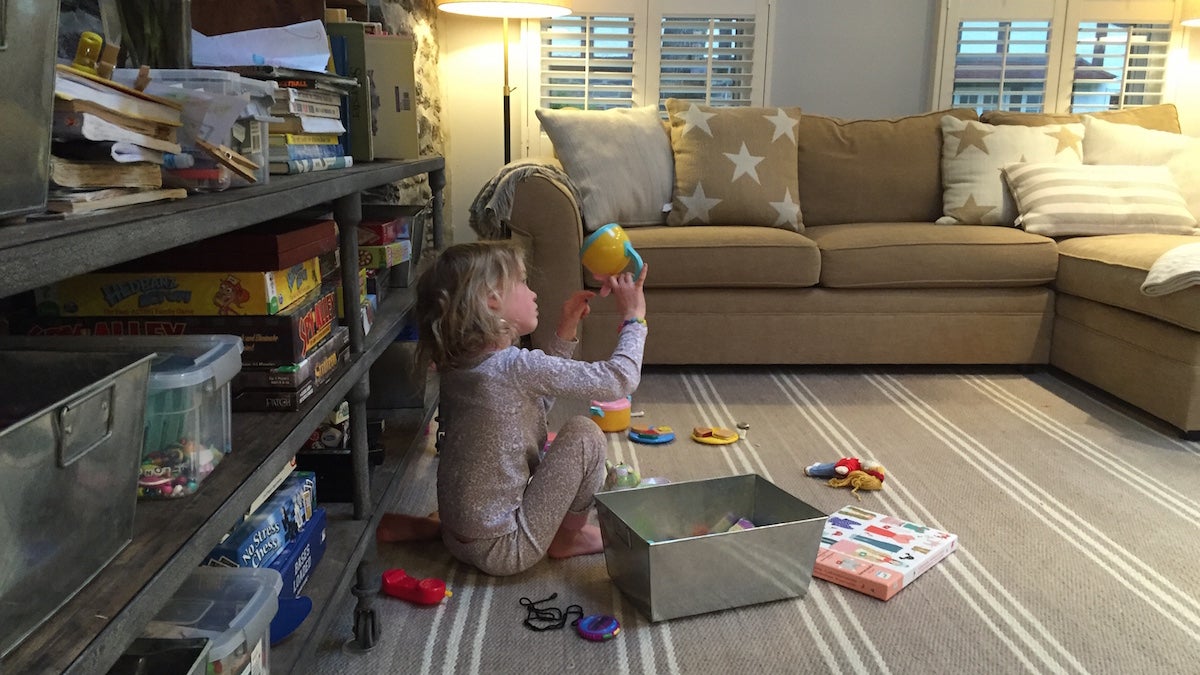Learning to let my kids make a mess

(Courtesy of Courtenay Harris Bond)
I am up at 3 a.m., looking at our rain-slick deck and wondering why I cannot sleep, a fairly frequent occurrence in my middle age when worries often chase me through the early morning hours.
As I listen to the hush of my husband and three children peacefully at rest, sometimes I will peek at my oldest daughter twisted sideways in her bed, her comforter yanked out from where I had so carefully secured it the previous morning.
I have to resist the urge to straighten it and risk disturbing the magical slumber of childhood that now eludes me with such regularity. Instead, I try to take in the mystical quiet of the moment.
I feel a powerful tenderness for my kids when I gaze at them at night, their faces turned up but not seeing me through their tangled dreams — a purity of love that sometimes eludes me during daylight hours when I often feel irritated by the commotion and messes they create.
Lately, I find myself repeating the words that someone once told me — that there are “no straight lines in nature” — almost like a mantra to combat my compulsive need for order, one so challenged by raising boy-girl twins and a third.
Against my better judgment, I am constantly trying to put everything back in place, only to have my kids disrupt the toys and books and dishes again as they whirl through our living space.
I know the tidiness I crave, almost like a drug, stems from growing up in a chaotic environment.
Early on, I tried to impose symmetry on the only aspects of my life that I could control: neatly stacking my books, folding my clothes, aligning my pencils. Focusing on these tasks made me feel like I was in charge of the outcome of my day and distracted me from more fundamental problems that I could not fix.
And in some ways, these compulsions have served me well as an adult.
I pay bills the day they arrive. I meet deadlines. On the mornings my children trudge off to school, I clean up in record time.
But order is ephemeral, bound to be unsettled. And as soon as my kids return with their overflowing backpacks, sticky fingers and muddy shoes, I have to remind myself that while it is alright to insist that they clear their plates and pick up their toys, scolding them for squirming and spreading and occasionally spilling is less ok.
With my children, I have tried to suspend my compulsive tendencies. I wait until they are out of the house or in bed to bustle around wiping counters, boxing crayons, fluffing pillows — aligning everything once again.
I cannot completely eradicate my need to establish equilibrium. So I’ve struck a devil’s bargain where I restore all the bits to their proper perches whenever I get the chance.
It is a Sisyphean task, ultimately futile in its nature, but one that expends my anxious energy and makes me feel temporarily in control.
Until the middle of the night, that is, when I find myself awake and contemplating life’s more consequential problems, whatever happens to be troubling one or more of our children at the moment.
To distract myself, I reach for the reading material is at hand, which the other morning was a mailing from Schoolhouse Electric, a Portland, Ore., furnishings company that embraces “scratches, fading and other signs of wear as badges of character.”
Somewhat shamefully, I realized I was having an epiphany in the middle of the night over a furniture catalogue, grasping with sudden clarity that the peeling paint, tumbled LEGOs, laugh lines and frayed nerves were actually the gifts that family life delivers.
I remembered what, of course, I’d long known, that our flaws are what make us unique, that we learn from our mistakes, that our own pain deepens our empathy.
“There is a crack in everything,” says Leonard Cohen. “That’s how the light gets in.”
And so I vowed, at least for now, to try to stop cleaning up my children’s messes and watch more closely what they discover through making them — to try to stop repairing the cracks and peer into them, instead, to see what lies on the other side.
WHYY is your source for fact-based, in-depth journalism and information. As a nonprofit organization, we rely on financial support from readers like you. Please give today.

